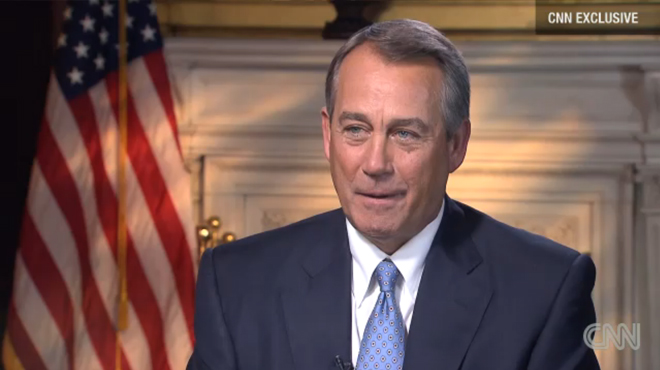House Speaker John Boehner is encouraging his members to support a crafty legislative response to the Obama administration’s decision to delay implementation of the Affordable Care Act’s employer mandate, according to a highly placed GOP source.
The strategy is two pronged. First, House Republicans would introduce legislation to effectively authorize the employer mandate delay by statute — effectively making the administration’s decision explicitly lawful. Subsequently, the House would vote on companion legislation to delay the law’s individual mandate by one year as well, creating a moral conundrum for Democrats, who have supported the reprieve for large employers.
“The president delayed Obamacare’s employer mandate, but he hasn’t delayed Obamacare’s individual mandate that impacts individuals and families,” Boehner told his members at a conference meeting Tuesday morning, according to a source in the room. “This is indefensible. Is it fair for the president of the United States to give American businesses an exemption from his health care law’s mandates, without giving the same exemption to the rest of America? Hell no, it’s not fair.”
Boehner floated the idea of sequential votes to delay both the employer and individual mandates. In making the case to his members, he argued, “We should be thinking about giving the rest of America the same exemption that Obama last week gave businesses,” he said, according to the source. “There’s a rickety old stool holding up this entire law. The legs of that stool are the individual parts of Obamacare — the individual mandate, the employer mandate, IPAB, etc. The president himself kicked one of those legs out from under the stool last week when he delayed the employer mandate. Acting to give the same delay to the rest of America … would be removing another leg from the rickety stool that’s propping Obamacare up.”
At the end of a Capitol press briefing after Tuesday’s meeting, Boehner made an oblique reference to the plan, telling reporters, “We’ll have another vote. Count on it.”
Reporters and Democratic flacks interpreted his remarks as a pledge that the House will vote again on legislation to repeal the ACA or its key components. House GOP leaders could introduce another repeal bill, of course. But Boehner’s plan is much shrewder. By bracketing the question of repeal, and forcing Democrats to decide whether to treat businesses and individuals equally, it sidesteps the most politically contentious aspects of the GOP’s anti-Obamacare strategy and makes Democrats essentially choose whether they value a smooth rollout in the coming months over the suggestion that they’re more concerned with the law’s cost and consequences for large businesses than for regular uninsured people.
But it’s also subterfuge. It’s hard to argue, as Boehner did, that the employer mandate and the Independent Payment Advisory Board are crucial tentpoles propping up the ACA. But the individual mandate certainly is. Delaying the employer mandate for a year actually facilitates the implementation of the core of the law. By contrast, delaying the individual mandate by a year introduces adverse selection into the insurance exchanges, creating an incentive for healthy people to eschew coverage, while premiums skyrocket for everyone else. That would be catastrophic for the rollout of the law, and a major liability for Democrats in the coming election.
So Democrats would be trapped — forced to support the individual mandate as it exists on the books, while simultaneously supporting a delay of the penalty on employers. That is, if Boehner can get his members on board.
But that’s not a sure thing. In the recent past, Republican rank and filers have rejected partial measures, including bills that repeal only certain components of the ACA, rather than the entire law. Most recently, they rejected a proposal by Majority Leader Eric Cantor to temporarily re-finance Obamacare’s state-based high risk pools with money taken from the law’s prevention fund. Likewise, they won’t necessarily support a temporary delay of either mandate if that could be construed as a de facto statement that the provisions should eventually come into existence. And though the two-bill strategy could embarrass Dems who vote to delay the employer mandate but not the individual mandate, it could simultaneously provide Obama explicit legal authority to do what he’s already done — a move that actually facilitates smooth ACA implementation — while leaving the individual mandate untouched.
But for Republicans who want to “heighten the contradictions,” the ideal scenario is actually the reverse.










